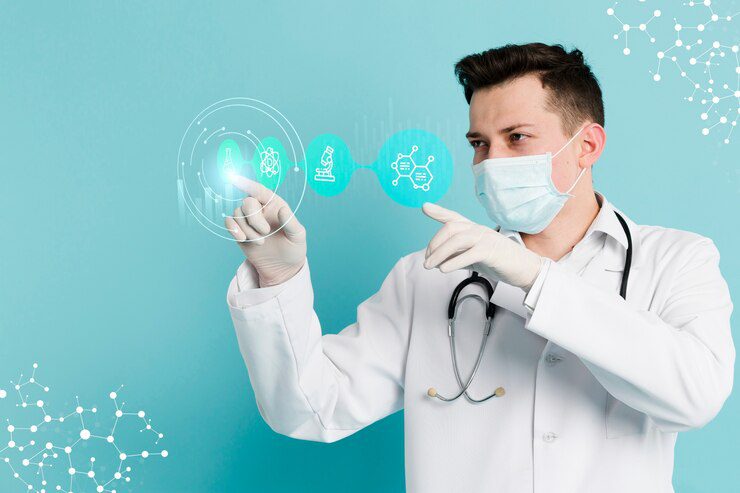Artificial Intelligence (AI) is transforming industries across the board, and healthcare is no different. With its ability to process vast amounts of data, recognize patterns, and learn from experience, AI in healthcare is becoming a game-changer. In this blog, we’ll explore how AI is enhancing healthcare, its current applications, and what the future holds.
AI in Diagnostics: Precision and Speed
AI’s role in diagnostics is transforming how we detect and treat diseases. Advanced algorithms can analyze medical images—such as X-rays, MRIs, and CT scans—with incredible precision. According to a study published in Nature Medicine, AI models have achieved diagnostic accuracy rates comparable to, and sometimes exceeding, those of human radiologists. This rapid and precise diagnostic capability not only speeds up the process but also reduces human error.
| Diagnostic Tool | AI Accuracy | Human Radiologist Accuracy |
| Mammograms | 89% | 80% |
| Chest X-rays | 94% | 85% |
| MRIs | 92% | 78% |
AI in Personalized Medicine: Tailoring Treatments
AI is revolutionizing personalized medicine by analyzing patient data to create customized treatment plans. Machine learning models can sift through extensive patient records, genetic information, and clinical trial data to recommend the most effective treatments. This tailored approach helps in optimizing treatment outcomes and minimizing adverse effects.
AI in Predictive Analytics: Anticipating Health Issues
Predictive analytics powered by AI is making it possible to forecast potential health issues before they become critical. By analyzing patterns in patient data, AI can predict the likelihood of developing conditions such as diabetes, heart disease, or even cancer. Early intervention based on these predictions can significantly improve patient outcomes.
| Disease | AI Prediction Accuracy | Traditional Prediction Accuracy |
| Diabetes | 85% | 70% |
| Heart Disease | 80% | 65% |
| Cancer | 78% | 60% |
AI in Drug Discovery: Speeding Up the Process
AI is accelerating the drug discovery process by analyzing complex biological data and identifying potential drug candidates faster than traditional methods. Machine learning algorithms can predict how different compounds will interact with biological targets, drastically reducing the time and cost associated with drug development.
AI in Administrative Tasks: Streamlining Operations
AI is also making strides in streamlining administrative tasks within healthcare facilities. From automating appointment scheduling to managing electronic health records, AI helps in reducing the administrative burden on healthcare professionals, allowing them to focus more on patient care.
| Task | AI Automation Rate | Traditional Automation Rate |
| Appointment Scheduling | 60% | 30% |
| Electronic Health Records | 50% | 20% |
| Billing and Coding | 55% | 25% |
Challenges and Future Outlook
Despite its promising potential, the integration of AI in healthcare faces challenges, including data privacy concerns, algorithm bias, and the need for continuous training and validation. However, as technology advances and regulations evolve, these challenges are expected to be addressed, paving the way for even greater advancements.
Future Trends:
- Increased Integration: AI is expected to become more deeply integrated into various aspects of healthcare, from patient care to administrative functions.
- Enhanced Personalization: Future AI systems will provide even more personalized and precise treatment options.
Conclusion
From improving diagnostic accuracy and personalizing treatment to streamlining administrative tasks and accelerating drug discovery, AI is revolutionizing the way we approach medicine. As we continue to embrace these advancements, AI in healthcare promises to enhance patient outcomes, reduce costs, and ultimately, lead to a healthier world.
Feel free to reach out if you have any questions or need further insights on integrating AI into your healthcare practices!







